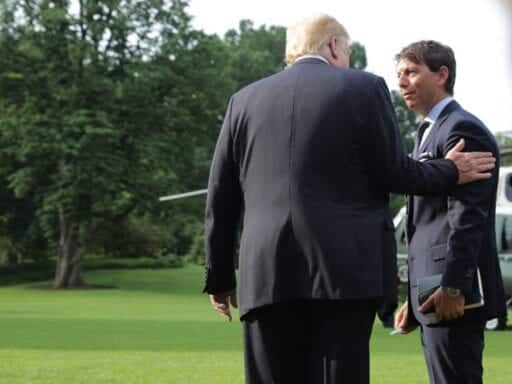For the Trump administration, incoherence is a feature instead of a bug.
One day after President Donald Trump pardoned or granted commutations to nine disgraced public figures who were convicted of corruption-related crimes, one of his spokespeople went on Fox News and claimed the move was rooted in principled opposition to harsh sentencing.
“The fact is the president is clearly against excessive sentencing, whether it’s Rod Blagojevich or Alice Johnson,” Hogan Gidley said. “These are nonviolent offenders.”
Nine days after Trump suggested drug dealers should be executed, here’s White House spokesperson Hogan Gidley claiming the president “is clearly against excessive sentencing, whether it’s Rod Blagojevich or Alice Johnson … these are non-violent offenders.” pic.twitter.com/c7c6jzI6Iv
— Aaron Rupar (@atrupar) February 19, 2020
This talking point might make sense if you just started paying attention to American politics yesterday. But some of us can remember as far back as nine days ago, when Trump suggested during a White House event that the best way to tackle drug problems in America would be to execute those convicted of nonviolent dealing offenses.
“States with a very powerful death penalty on drug dealers don’t have a drug problem,” Trump said then. “I don’t know that our country is ready for that, but if you look throughout the world, the countries with a powerful death penalty — death penalty — with a fair but quick trial, they have very little if any drug problem. That includes China.”
Trump suggests he’d like to model American criminal law on drug dealing on authoritarian systems like China, where dealers are executed: “Countries with a powerful death penalty, with a fair but quick trial, they have very little if any drug problem. That includes China.” pic.twitter.com/9WprysjJAX
— Aaron Rupar (@atrupar) February 10, 2020
In fact, despite what Gidley would have you believe, support for extremely harsh sentencing has kind of been Trump’s thing. In the late 1980s, he infamously argued that a group of black and Latino teens known as the Central Park Five should be put to death for a rape they were falsely accused of committing (he still refuses to admit he was wrong to do so). The signature chant at his political rallies, “Lock her up,” is an endorsement of extrajudicial punishment for unspecified offenses. He’s hailed stop-and-frisk policing and lauded police for roughing up suspects.
Gidley’s talking point in defense of Trump’s pardons and commutations is incoherent. But it’s becoming increasingly clear that for this White House, the incoherence is a feature instead of a bug.
Consider that Trump — arguably the most personally corrupt president in American history — pardoned or granted commutations to a veritable who’s who of corrupt public figures in the immediate aftermath of an impeachment trial where one of his central defenses was that he’s a staunch opponent of corruption. And yet his refusal to break decades of precedent by refusing to divest from his businesses means he was in the awkward position of making that case while foreign governments, corporations, and politicians could directly line his pockets by spending money at his properties.
Or consider that on Wednesday, Secretary of State Mike Pompeo criticized China’s move to expel Wall Street Journal reporters by proclaiming that “Mature, responsible countries understand that a free press reports facts and expresses opinions” — ignoring that less than a month ago, the State Department banned NPR reporters from traveling with Pompeo because one of them committed the sin of asking him a question he didn’t like.
To cite another example just from today, consider that press secretary Stephanie Grisham claimed Trump “barely knows” former Republican Rep. Dana Rohrabacher in response to a story about Trump reportedly dangling a pardon for WikiLeaks founder Julian Assange through Rohrabacher — even though the two have met at the White House and Trump has repeatedly shouted him out at public events and on Twitter.
The picture that emerges is one of an administration that doesn’t care about consistency, coherence, or blatant hypocrisy. Trump makes impulsive decisions and his spokespeople get busy spinning it, often in ways that directly contradict previous things he’s said and done. Other countries do things and the Trump administration tries to take advantage of it by virtue signaling, even when the virtues they pay lip service to are ones they’ve actively denigrated through their actions.
The truth of the matter is that Trump’s latest batch of pardons and commutations were not about his sympathy for nonviolent offenders. They were about normalizing the sort of obstruction of justice and financial crimes he’s been implicated in, as well as laying the groundwork for pardoning or commuting the sentence of longtime confidant Roger Stone, who’s scheduled to be sentenced on Thursday.
But since the White House can’t just come out and admit that, they’re coming up with alternative explanations. And apparently anything will suffice.
The news moves fast. To stay updated, follow Aaron Rupar on Twitter, and read more of Vox’s policy and politics coverage.
Author: Aaron Rupar
Read More



